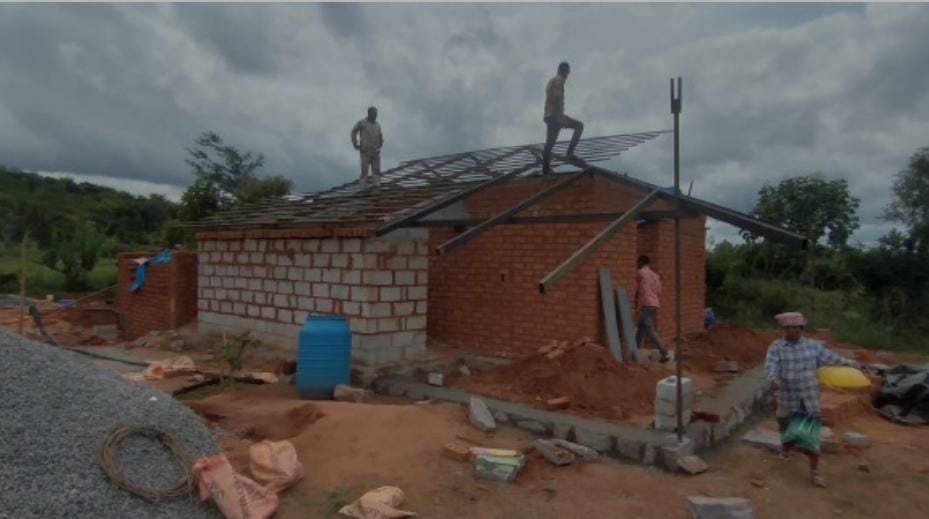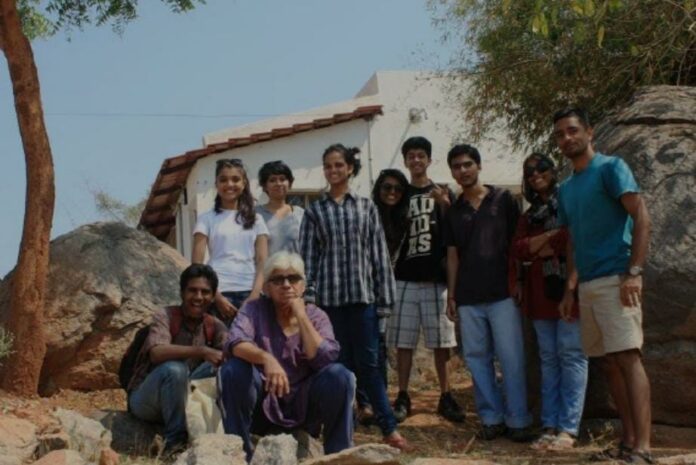Sabiha Hashmi, a 72-year-old retired educator has been teaching and sponsoring the education of girls in Karnataka’s Ramanagara district since 2011.
Being a teacher for more than four decades now, Hashmi hasn’t parted ways with teaching even after retirement. She is going the extra mile to uplift the young girls from marginal backgrounds by providing them with books, skill training, and footing their school fees along with teaching subjects like English.

Basically from Delhi, Sabiha, a Ph.D. from the National Museum Institute of the History of Art, Conservation, and Museology, has introduced thousands of young children to the world of colors, sketching, painting, printing, art history, and aesthetics.
She taught at Modern School in Delhi and set up the art department at Heritage School in Gurgaon. After shifting to Bangalore, she taught in several schools promoting alternative learning like Poorna Learning Centre and Pramiti School.
After her retirement, when she decided to spend time supporting the education of young girls in Jyothipalaya village of Ramanagara district. She bought a piece of land, built a cottage in Magadi Taluk, and moved there. The children in the village started calling her ‘Ajji’ and her land, which is now converted into a farm came to be known as ‘Ajji’s Farm.’

During the first year in 2012, she started collecting donations from friends and family to support her initiative. However, Hashmi realized that a long term solution needs to be put into force in order to sustain her initiative, so she used her expertise and taught the girls and their mothers recycling cardboard and fabric waste to produce book racks, pencil holders, TV remote
boxes, organizers, toy boxes, waste paper bins, and jewelry boxes. They started selling these products, and the money earned was used as the school or tuition fees of the girls.
Sabiha organized the distribution of storybooks to primary schools in nearby villages, which resulted in children who never got to read anything but textbooks having access to storybooks.
Talking to THG, Sabiha’s sister Shabana Hashmi said, “Sabiha is starting a Learning Centre for the Jyothipalaya village, which will also cater to the surrounding five villages. It will mainly teach young boys and girls, computers and arts education. It also has a library and several other activities. The centre is being constructed right now and we intend to initiate and open it by mid-January next year.”
Sabiha is building a library and a learning center for youth living in Jyothipalaya and neighboring villages. Jyothipalya is surrounded by five villages, all these have school-going children who would greatly benefit from access to a library and computers with internet connections.
When asked why Sabiha choose to teach in rural areas after her retirement, her sister said, “She has been a trekker all her life and wherever she went, she found the condition of the women was very pathetic. Sabiha wanted to help women, especially in rural areas. Therefore, she bought a piece of land with whatever money she had and moved to the village.
In her middle age, Sabiha was a regular trekker and completed a mountaineering course from Western Himalayan Mountaineering Institute. She took regular batches of students trekking to the Himalayas and rock climbing at the Aravallis, organized by the Climbers and Explorers Club.
“Sabiha has been supporting girls’ education, including supporting single mothers in the village. In fact, because of her number of girls have completed their graduation,” Shabana Hashmi said.
Amongst the girls that Sabiha has been helping, one has completed her B.Ed. with a high first-class and another has cleared her B. Com with 74% marks.
“At Ajji’s’ learning centre, the plan is to provide technical education to the young people around that area. We’re hoping that a lot of people from Bengaluru, who do not have time to spend with nature can come and do rock climbing, spend a day or night in the open,” she said.
At ‘Ajjis’, rural children will not only develop a reading habit but also learn to use computers and media arts. They can find opportunities to spend time in creative activities with Sabiha’s assistance in story writing, painting, sketching, screen printing, collage making, woodworking, pottery, making sculptures, upcycling scrap, recycling waste fabric and cardboard cartons to create utilitarian and aesthetic products. Nature walks and organic farming are a few other activities to be facilitated.
Shabana said that even before the lockdown, Sabiha has been organizing regular trekking and other activities, “Where students come and learn about organic farming, rock climbing, etc”
The center will be eco-friendly, reclaimed, and upcycled material with solar power installations and rainwater harvesting structures.



